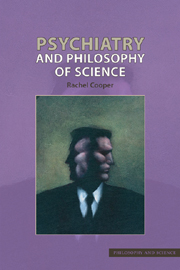Book contents
- Frontmatter
- Contents
- Acknowledgements
- 1 Introduction: psychiatry and philosophy of science
- 2 The nature of mental illness 1: is mental illness a myth?
- 3 The nature of mental illness 2: if mental disorders exist, what are they?
- 4 Explanations in psychiatry 1: natural-history based explanations
- 5 Explanations in psychiatry 2: individual case histories
- 6 Relations between theories 1: when paradigms meet
- 7 Relations between theories 2: reductionisms
- 8 Managing values and interests 1: psychiatry as a value-laden science
- 9 Managing values and interests 2: big business and judging treatments
- 10 Conclusion
- Notes
- Further reading
- Bibliography
- Index
2 - The nature of mental illness 1: is mental illness a myth?
- Frontmatter
- Contents
- Acknowledgements
- 1 Introduction: psychiatry and philosophy of science
- 2 The nature of mental illness 1: is mental illness a myth?
- 3 The nature of mental illness 2: if mental disorders exist, what are they?
- 4 Explanations in psychiatry 1: natural-history based explanations
- 5 Explanations in psychiatry 2: individual case histories
- 6 Relations between theories 1: when paradigms meet
- 7 Relations between theories 2: reductionisms
- 8 Managing values and interests 1: psychiatry as a value-laden science
- 9 Managing values and interests 2: big business and judging treatments
- 10 Conclusion
- Notes
- Further reading
- Bibliography
- Index
Summary
Unlike most sciences, the basic subject matter of psychiatry is contested; there are many theorists who have claimed that mental illness does not exist. The “antipsychiatrists” of the 1960s are the best known among those sceptical of the category of mental illness. The antipsychiatrists were a diverse group, united only in their suspicion of psychiatry. Each had different reasons for rejecting the category “mental illness”: David Rosenhan (1973) claimed that psychiatrists cannot distinguish the sane from the mentally ill; Thomas Szasz (1960; 1972) claimed that psychiatrists wrongly label social misifits; R. D. Laing and A. Esterson (1970) argued that schizophrenics are fundamentally normal individuals who are made scapegoats by their families; Michel Foucault (1971) argued that “mental illness” is a historically contingent category. Although the antipsychiatrists had dif erent reasons for rejecting the category of mental illness, in every case the basic thought is that judgements of mental illness are radically unstable (varying with perceiver, historical period or social context) and that this throws the reality of mental illness into question. In this chapter I shall examine, and ultimately reject, the antipsychiatrists' arguments.
Is mental illness in the eye of the psychiatrist?
In 1973 Rosenhan published his famous paper “On Being Sane in Insane Places”. Rosenhan had persuaded eight sane people to see whether psychiatrists could distinguish them from the insane. The pseudo-patients told hospital admissions staf that they heard a voice that said “thud”.
- Type
- Chapter
- Information
- Psychiatry and Philosophy of Science , pp. 11 - 27Publisher: Acumen PublishingPrint publication year: 2007



